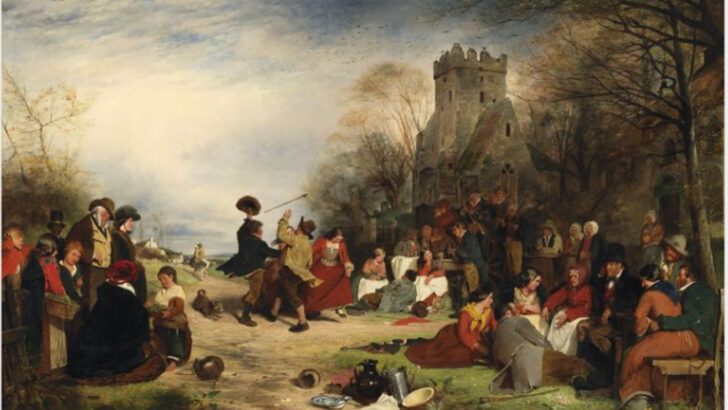Over all the European countries – and North America – migration and immigration are among the most persistent topics which concern the public. In the crucial German general election, coming up on February 23, it’s the prime issue. The French are obsessed with the topic. In Britain, Nigel Farage’s ‘Reform’ party – deeply critical of mass emigration – is consistently surging ahead in the polls, destroying the Tories and eating away at Labour’s base too.
Importance
And it is a subject of importance in Ireland too, especially in light of a severe housing crisis. And, sometimes, anxiety about public disorder.
It should be possible to have free conversations about this without charges of ‘racism’, ‘far-right politics’ or ‘fascism’”
Immigration issues will be with us all for some time to come, and the pros and cons argued. One aspect that I often see mentioned is – “does a society change its identity under the weight of mass immigration?” It should be possible to have free conversations about this without charges of ‘facism’, ‘far-right politics’ or ‘fascism’.
Impact
Yet there are surprising developments in examining the impact of immigration on host societies. A new British study, carried out by the official Office of National Statistics, predicts that ten million more immigrants will be absorbed into Britain over the next twenty years.
And one salient outcome is that this development will make the country more religious.
Reversed
Grace Davie, sociology professor at the University of Exeter, says that the tendency of decline in religious practice in Britain is being reversed through immigration. New migrants are usually more devout, and they will increase religious sensibilities within the host society. Professor Davie thinks that the secularist mindset will need to adjust and change.
To some extent, such changes are already happening. Perhaps surprisingly, London turns out to be the most religious part of Britain – because it is most cosmopolitan, and attracts the young.
This pattern will surely be repeated in Ireland: ironically, the political class most inclined to the left, and most eager for secularisation, may find itself faced with an increased religious social presence.
Freedom of speech
Like many brilliant tekkies, ‘First Buddy’ Elon Musk seems an odd character. At 53, he jumps around like an adolescent. He sometimes makes wild statements about matters he doesn’t know much about.
It is reported that he has dyspraxia, which affects the co-ordination of movements – perhaps accounting for hyper-active appearances on public platforms. His genius for engineering and building rockets might perversely contribute to some of his rasher impulses – “act fast and break things” is said to be the motto of creative disrupters.
In his favour, he completely supports freedom of speech, and doesn’t object to anything said about him, even on his own social medium, ‘X’.
And he does something I’ve never seen a professional man do before – he takes his young son to work, the lad sitting atop his shoulders.
He is a fervent advocate of pro-natalism – constantly saying humanity needs more babies. He has twelve children (one deceased from a cot death) and says about fatherhood: “Of anything in my life, I would say kids by far make me happiest.”
Archbishop Salvatore Cordileone of San Francisco has applauded Musk’s pro-child views as “lovely”, but he has added a coda: “But marry first and love your babies’ mom too.”
Mr Musk’s approach to marriage seems somewhat staccato – there seem to have been four marriages, including a divorce, a remarriage and a re-divorce. It doesn’t look as though he’s a candidate for taking the Archbishop’s marital advice.
I’m in two minds about the annual jamboree involving politicians travelling abroad for St Patrick’s Day. On the one hand, it’s always been impressive to note just how universal St Patrick’s Day is – bells ringing out in 800 churches around the world for our national saint. That puts Ireland on the map – why not trumpet it?
Moreover, there’s always been a certain amount of “paddywackery” involved in the celebrations. Roistering and revels have also been associated with the March 17 tradition: there’s a wonderful painting by the Scottish artist Erskine Nicol in Dublin’s National Gallery of St Patrick’s celebration in 1856. Even in that sombre post-Famine era, there was dancing and bibulous partying, held in the grounds of the church.
But the ‘transactional’ – that Trumpian word – element of the political Patrick’s Day assignments is now so blatantly utilitarian and instrumental. The presentation of shamrock at the White House is, on the American side, about the Irish-American vote; on the Irish side, it’s been about attracting financial investment. The discourse over this year’s event is more than usually overt about whose material interest is best served.
It would be nice if the significance of Patrick’s spiritual and civilisational legacy was occasionally mentioned in the public realm.


 Mary Kenny
Mary Kenny The 16th, 17th (St Patrick’s Day), and 18th March
The 16th, 17th (St Patrick’s Day), and 18th March
